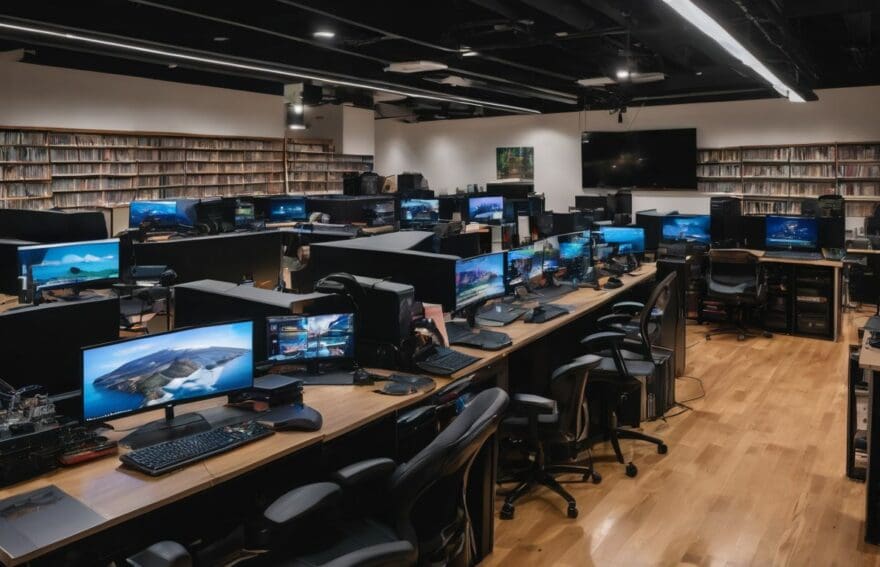Esports and Academia: Research and Teaching Opportunities

Updated On: October 30, 2025 by James Connolly
Curious about the nexus between competitive gaming and academia? You’re not alone in this; it’s quite the hot topic. The good news is that for students who are captivated by esports, there’s a brilliant opportunity to sharpen their STEM capabilities while having a blast.
In our latest blog post, we explore how this digital arena can be an educational treasure trove. We’ve packed it with scholarly insights and practical methods for educators to tap into the learning potential of esports.
So go on, take the plunge – let’s turn gameplay into an academic adventure!
The Rise of Esports in Education
Esports has become an increasingly popular tool in engaging students in STEM studies and enhancing cognitive skills. The integration of gaming in academic settings has opened up a world of opportunities for both students and educators alike.
Engaging students in STEM studies
We’ve discovered that integrating esports into our curriculum hooks students into STEM subjects like nothing else. Solving complex problems in-game requires a deep understanding of mathematics, physics, and computer science—the same skills needed in today’s tech-driven industries.
Our gaming enthusiasts quickly see the connection between their passion for video games and potential careers in STEM fields. They jump at the chance to design game levels or code new features, blending play with learning seamlessly.
By setting up esports labs, we offer hands-on technology experience that spills over into academic achievement. Pupils who are part of esports clubs tend to have better attendance and even perform well in reading and math exams.
This extracurricular activity becomes a bridge for them: they learn valuable teamwork and communication skills while mastering technology that could shape their future job prospects within the gaming industry or beyond it in broader STEM-related roles.
Enhancing cognitive skills
Participating in esports has been found to enhance cognitive skills, including critical thinking and problem-solving abilities. Research shows that gaming can improve decision-making, spatial awareness, and attention to detail.
Engaging in esports activities can also promote quick thinking and strategic planning skills, offering valuable mental stimulation for players. These cognitive benefits not only contribute to academic success but also provide essential life skills that can be applied beyond the gaming environment.
Moreover, involvement in esports presents a unique opportunity for students to develop their technology skills while honing their cognitive abilities. The combination of critical thinking and technology fluency gained through esports participation positions students for success in both academic pursuits and future career opportunities.
Career Opportunities for Students in Esports
Students who are passionate about esports can pursue various job prospects in the industry, such as esports coaching, event management, marketing, and content creation. Additionally, the versatility of an esports lab can provide students with hands-on experience in technology skills development, preparing them for a range of career paths within the esports field.
Job prospects in the esports industry
Esports offers a wide range of job prospects for individuals with a passion for gaming and technology. The industry’s rapid growth has created opportunities in various areas such as game design, content creation, event management, marketing, and coaching.
With an increasing demand for professionals who understand the gaming landscape, students with expertise in esports are perfectly positioned to pursue careers in STEM-related fields.
Esports also presents openings for faculty positions at academic institutions. As more schools incorporate esports into their curriculum, there is a growing need for educators who can teach and guide students in this field.
Versatility of an esports lab
Exploring the potential of esports labs in academia reveals their versatility. By integrating cutting-edge technology and industry-standard equipment, these labs offer students practical experience in gaming design, data analysis, and tournament management.
The flexible nature of esports labs allows for interdisciplinary collaboration by incorporating aspects of computer science, marketing, and event planning. Moreover, these environments provide an opportunity for research into human-computer interaction and the impact of gaming on cognitive development.
Such facilities are vital not only to cultivate future esports professionals but also to advance scholarly work in this burgeoning field.
Openings for esports faculty jobs
Esports in academia have opened up new opportunities for faculty positions. As the esports industry grows, educational institutions are seeking qualified individuals to lead and instruct esports programs.
Faculty jobs in this field offer a chance to combine a passion for gaming with teaching and research. These roles may involve instructional design, curriculum development, and overseeing extracurricular activities related to gaming and education.
With the increasing interest in integrating esports into academic settings, there is a rising demand for educators who can bring their expertise into this dynamic space.
Benefits of Incorporating Esports in Academia
Incorporating esports in academia promotes critical thinking skills, enhances problem-solving abilities, and improves teamwork and communication among students. These benefits contribute to a more dynamic and engaging learning environment for students of all levels.
Promoting critical thinking skills
Esports in academia can actively promote critical thinking skills, enabling students to analyse complex game scenarios and make strategic decisions. Through gaming, players are constantly required to assess situations, consider multiple factors, and devise effective solutions, honing their critical thinking abilities.
This practical application of problem-solving within esports not only enhances cognitive development but also fosters an essential skill set for academic success and future careers in STEM fields.
Engaging with esports can provide a dynamic platform for honing critical thinking skills while creating real-world connections that resonate with academic objectives. Active participation in esport activities has shown potential for improving analytical reasoning and decision-making capabilities among students, contributing significantly to enriched learning experiences in the classroom.
Enhancing problem-solving abilities
Participating in esports not only promotes critical thinking skills but also enhances problem-solving abilities. Gamers are constantly challenged to strategise and adapt their tactics, which can significantly improve their ability to analyse situations and make quick decisions.
As a result, students who engage in esports develop sharper problem-solving skills that can be applied both inside and outside the gaming world. This translates into real-world scenarios where individuals need to think critically and find solutions to complex problems, making esports an invaluable tool for cognitive development.
Improving teamwork and communication
Participating in esports not only enhances problem-solving abilities but also fosters teamwork and communication skills. Students involved in school-sponsored esports leagues have the opportunity to develop crucial collaborative skills that are essential for success in both academics and future careers.
As they work together to strategise, execute plans, and communicate effectively with their teammates during gameplay, students can cultivate important interpersonal skills that are transferable to various aspects of their lives.
This experience offers valuable preparation for real-world scenarios where effective teamwork and communication are vital for achieving common goals.
Research on Esports and Cognitive Development
Exploring the potential of esports in education has shown promising findings on the benefits of gaming for cognitive development. To learn more about how esports can enhance critical thinking and problem-solving skills, continue reading our blog.
Findings on the benefits of gaming
Research findings have demonstrated the positive impact of gaming on cognitive development, proving that it can enhance problem-solving skills and critical thinking abilities. Furthermore, engagement in esports has been associated with improved teamwork and communication skills, providing students with valuable real-world competencies.
Esports not only offers an enjoyable pastime but also promotes skill development that is highly transferable to academic and career pursuits.
The benefits of gaming extend beyond entertainment, as studies show its potential to foster student success by enhancing cognitive abilities and preparing individuals for future job opportunities in STEM-related fields.
Exploring the potential of esports in education
Esports present the potential to transform education by engaging students in interactive and immersive learning experiences. Research has shown that incorporating esports into academic settings can enhance cognitive development, critical thinking skills, and problem-solving abilities.
This not only fosters student success but also opens up new career opportunities in the gaming industry for aspiring professionals. Moreover, the integration of esports in education can create a healthy learning environment by promoting teamwork, communication skills, and overall student wellness.
Furthermore, esports offer research and teaching opportunities for educators across different academic levels – from K-12 to higher education. By leveraging the benefits of gaming and STEM studies, schools can create dynamic curriculum developments that support student engagement while preparing them for future job prospects in this rapidly growing industry.
Creating Healthy Learning Environments Through Esports
Supporting staff and student wellness is essential in creating an environment that fosters academic and personal growth, and incorporating esports can contribute to this goal. To learn more about the potential of esports in academia, read our full blog post.
Supporting staff and student wellness
Esports can contribute to supporting staff and student wellness by providing a platform where students can find a sense of belonging, build social connections, and strengthen their mental well-being.
Engaging in esports can offer students an outlet for stress relief, boosting their overall emotional health, while also encouraging physical activity through team collaboration and communication skills development.
Additionally, integrating wellness programs into esports initiatives further promotes a healthy school environment, benefitting both the academic and personal growth of students.
Teachers and staff members involved in esports activities can also experience improved job satisfaction and enhanced workplace morale as they interact with students on a meaningful level.
School transformations with esports
By incorporating esports into the academic environment, schools can undergo notable transformations. The integration of esports fosters an inclusive and engaging atmosphere for students, creating new opportunities for teamwork and collaboration.
Esports also presents potential career paths in STEM fields such as game design and development, thus equipping students with practical skills that are increasingly in demand by employers.
Additionally, the rise of school-sponsored esports leagues promotes positive interactions among students while simultaneously encouraging critical thinking skills and enhancing communication abilities.
The introduction of esports technologies in schools not only offers a unique platform to engage students but also provides educators with innovative teaching and research opportunities.
Conclusion: The Future of Esports in Education
In conclusion, the integration of esports in academia offers various research and teaching opportunities for educators. Esports not only promote critical thinking and problem-solving skills but also improve teamwork and communication abilities among students.
This innovative approach fosters student success and opens up new career pathways, reflecting the bright future of esports in education.
FAQs
1. What opportunities are there for esports in academia?
There are growing opportunities within academics such as faculty positions in esports, research on cognitive development through gaming, and incorporating games into education for both academic studies and extracurricular activities.
2. How can esports be used in the classroom to engage students?
Esports and video games can enhance student engagement by being integrated into digital gaming and learning curriculums, offering game-based learning experiences that connect with their interests.
3. Are there any benefits to teaching about video games in academia?
Teaching about video games in academia helps explore the impact of virtual sports on learning, contributes to esports curriculum development, and includes the study of online gaming within academic research.
4. Can involvement in esports boost cognitive development?
Cognitive development can be supported through strategic thinking and problem-solving found in many aspects of competitive gaming researched under educational settings related to esports.
5. Is it possible to have a career combining education with a passion for gaming?
Absolutely! With Esports making strides within educational systems, careers options now include roles focused on developing game-based learning initiatives or driving forward innovative teaching approaches involving interactive technologies like online gaming.








